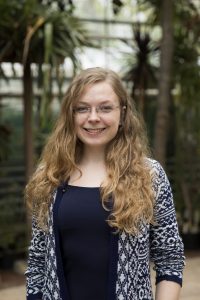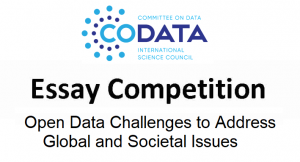 The CODATA Connect Early Career and Alumni Network is pleased to announce the winner of the (inaugural) 2020 Essay Competition is Esther Plomp from Delft University of Technology (TU Delft, the Netherlands)!
The CODATA Connect Early Career and Alumni Network is pleased to announce the winner of the (inaugural) 2020 Essay Competition is Esther Plomp from Delft University of Technology (TU Delft, the Netherlands)!
Esther’s essay “Going digital: persistent identifiers for research samples, resources and instruments” was unanimously considered to be the best of a strong field by the panel of judges from CODATA Connect, the CODATA Executive Committee and the Editorial Board of the Data Science Journal.
Judges praised the quality of Esther’s essay and suggested that not only was it worthy of publication in the DSJ, but that it would also be a useful reference for data stewards.
As winner, Esther’s prize is twofold. After peer review and response to any suggestions and recommendations, her essay will be published in the Data Science Journal, with the APC covered by CODATA. Additionally, CODATA will support her participation in International Data Week, in Seoul, Republic of Korea, 8-11 November 2021! We are currently planning that this will be hybrid physical and virtual and we hope that the global health situation will allow maximum in-person participation.
“Many thanks for the news that my essay was selected as winner!”, was Esther’s response to the news. “I’m very grateful for this positive news in these strange times. I would of course love to participate in next year’s International Data Week, hopefully physically if this is possible again!”
The other shortlisted essays were from Joshua Borycz, Vanderbilt University, USA, for his essay “Changing incentives can change the world: Data consultancy and the open data revolution” and Francesca Eggleton and Kate Winfield, both STFC, UK, for their piece on “Open data challenges in climate science”. Joshua, Fran and Kate have also been invited to submit their essays to the Data Science Journal and the APCs will be covered by CODATA.
Watch out for these essays when they are published in the Data Science Journal And stay alert for the announcement of the 2021 CODATA Connect Essay Competition!
Winner: Esther Plomp
Esther Plomp (0000-0003-3625-1357, @
The essay “Going digital: persistent identifiers for research samples, resources and instruments” discusses the uptake of Persistent Identifiers (PIDs) in research. The uptake of PIDs for physical aspects of research (such as samples, artefacts, reagents and analyses instruments) has thus far been embraced primarily for use in the fields of Earth and Life Sciences. Wider adoption of PIDs for physical aspects of research can improve the findability and accessibility of these resources, which will allow for data to be put into more detailed context. By using PIDs all the information about a sample or artefact will be available in a single location, which allows for links to other sources of relevant information. Through the use of interoperable (metadata) standards and shared forms of documentation it will be easier to collaborate across multiple disciplines and the reusability resulting data and the physical samples and artefacts themselves will improve. Wider adoption of PIDs for physical aspects of research is challenging, as research communities will have to work together to establish relevant standards that are meaningful across multiple domains. The essay is a call to action for researchers to adopt and extend the existing standards and implement PIDs for the physical aspects of their research.
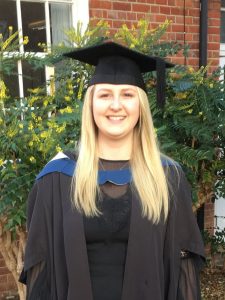 Shortlisted: Francesca Eggleton and Kate Winfield
Shortlisted: Francesca Eggleton and Kate Winfield
Francesca Eggleton: I work as an environmental data scientist at the Centre for Environmental Data Analysis (CEDA) at the Science and Technology Facilities Council (STFC). I have been in this role for over a year and half after joining through their graduate program. My role includes archiving and managing data from NERC (Natural Environment Research Council) funded projects and other scientific research, such as European Space Agency (ESA) Sentinel satellites and CMIP6 (Climate Modelling Intercomparison Project Phase 6). Previously, I did an MSc Applied Meteorology degree at Reading University and a BSc Environmental Science degree at Plymouth with a year placement at the United Kingdom Hydrographic Office (UKHO). Throughout this time, I focussed mainly on learning more about climate change, as this is something I am very passionate about.
Kate Win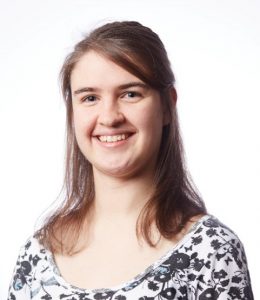 field: I am an environmental data scientist at the Centre for Environmental Data Analysis (CEDA) at the Science and Technology Facilities Council (STFC). I joined CEDA through the graduate scheme in 2017 following a degree in BSc Geography at Coventry University and a year in industry at CEDA. I support data management for NERC (Natural Environment Research Council) funded projects and other general science programmes, such as ESA Climate Change Initiative and IPCC Working Group 1, that support atmospheric and earth observation measurements.
field: I am an environmental data scientist at the Centre for Environmental Data Analysis (CEDA) at the Science and Technology Facilities Council (STFC). I joined CEDA through the graduate scheme in 2017 following a degree in BSc Geography at Coventry University and a year in industry at CEDA. I support data management for NERC (Natural Environment Research Council) funded projects and other general science programmes, such as ESA Climate Change Initiative and IPCC Working Group 1, that support atmospheric and earth observation measurements.
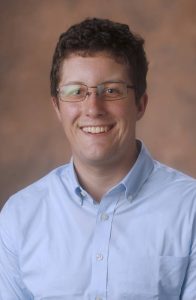 Shortlisted: Joshua Borycz
Shortlisted: Joshua Borycz
Joshua Borycz is a Librarian for STEM Research at Vanderbilt University. He has a PhD in Chemistry from the University of Minnesota, Twin Cities and a Master’s Degree in Information Science from the University of Tennessee, Knoxville. His PhD work focused on quantum mechanical calculations of metal-organic frameworks to determine potential applications in magnetic sensing, small molecule filtration, and catalysis. After performing chemistry research for 5 years Joshua became interested in how the research practice itself might be improved. His research focus during his Master’s in Information Science was on the data management and sharing attitudes and practices of scientists. The goal of this research was to determine the barriers that prevent scientists from organizing and sharing data and to work towards removing those barriers to establish open data practices.

